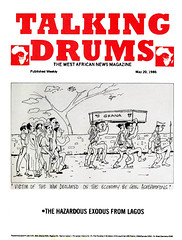Nyerere's problems with socialism in Tanzania
By Ebo Quansah
Like the late Sekou Toure of Guinea, Dr Nyerere might have realised in the evening of his rule that far from improving the lot of a people who gave him every loyalty, his hard-line Socialist policies have only succeeded in worsening their plightThe scenario might be far-fetched. But President Julius Nyerere's description of nationalization of Tanzania's sisal estates in 1967 as a "blunder" could be the ageing Head of State's premonition of the ill-consequences of his African socialism concept.
"We made a mistake to nationalise these estates then boasted that our people would manage them better than their former owners", Dr Nyerere was quoted by The Guardian of May 7, to have told a public meeting in Dar-es-Salaam.
"It is better to see properly managed sisal estates that are owned by private firms than to see those of the Tanzania Sisal Authority (state-owned) that have turned into bush" the President said. This statement would definitely disturb quite a number of people who still believe that socialism, with its Marxist-Leninist rhetorics, is the only concept capable of delivering Africa from the woods and Dr Nyerere the man properly equipped to lead the fight against neo-colonialist exploitation.
To keen students of African politics however, the surprise does not lie in the sudden turn-about but in the timing. At 63, President Nyerere is due to retire as Head of State in three months time. Why he waited until the eve of his departure before realising the obvious is what baffles political observers.
Like the late Sekou Toure of Guinea, Dr Nyerere might have realised in the evening of his rule that far from improving the lot of a people who gave him every loyalty, his hard-line socialist policies have only succeeded in worsening their plight.
While socialism helped to raise literacy and health standards and brought relative stability to a country in a volatile continent like Africa, President Nyerere's score cards on the economic front could not earn him even a draw were he in a boxing match.
The frustration of President Nyerere is but a picturesque of the nature of the problems that have devastated the continent of Africa.
The problem is even more acute in the ECOWAS sub region where most countries have had the misfortune of being exposed to socialism at one point or another as their leaders turned to the East in their quest for solutions.
Because of its total abhorrence of dissenting views, socialism has the tendency of driving away its critics who invariably are the intelligentsia of the society. This results in a brain drain that leaves political authority, which is the vehicle on which economic direction depends, in the hands of men and women whose main qualification for holding key positions is slogan chanting.
What came to be known as the 'veranda boys' era of Kwame Nkrumah's Ghana is a classic example of mediocrity misdirecting affairs.
ISOLATION
Another by-product of socialism that has a harmful effect on the economy, is the tendency to isolate nations. Because of the fear of "contamination" of its citizens and a probable revolt, leadership of African socialist countries tends to shut their borders from western influence. And since economic investments usually flow from the West, African socialist countries find it politically expedient keeping their natural resources untapped while its citizens go hungry.Sekou Toure of Guinea was notorious in this sphere. While Guinea sat on untapped rich bauxite deposits, citizens of this West African country lived like flood victims temporarily resettled somewhere, while its Head of State gloried in self-adoration. Guinea Bissau under the Cabrals is another example of economic stagnation from isolation.
With the exception of the 1966 Coup in Ghana and the overthrow of the civilian regime in Guinea last year, the message of all the West African coup makers has been the equal distribution of wealth which socialism claims to seek. Kerekou of Benin, late Acheampong and Jerry John Rawlings, Doe of Liberia, Kountche of Nig Sankara of Burkina Faso all came power promising socialist goals.
Invariably they succeed at distributing not wealth but poverty among a group of people who could have otherwise managed a more decent standard of living.
The reason for this dilemma lies in the soldier's mediocrity. On attaining power, West African soldiers realize too soon that managing a nation is far cry from finding the target at a firing range.
In their effort to cling to power the wake of civilian opposition soldier-politicians direct much of the nation's resources into defence. Much of the nation's imports go into arming the military to the neglect of vital sectors of the economy.
The tendency to nationalize industries, which goes hand in hand with socialism, creates apathy leading to total neglect and hence the abandoning of vital sectors of the economy.
Despite what Marxist-Lennini believers would want the world to believe, West African customs and beliefs dating from the ancient times borders on individualism. Wealth and opulence, symbols of authority and traditional homes are measured not in terms of what society can produce but how much one can command at another point in time.
Socialism with its demand o dogmatic obeisance from the government has only succeeded in widening the scope of confusion in West Africa Apart from such a natural catastrophe as drought, socialism, that does no induce accountability from those directing the ship of state, is what has contributed to make life a difficult task in West Africa.
Whether or not President Nyerere's obvious admission of the failure of his African socialist concept will serve any useful lesson remains to be seen.
